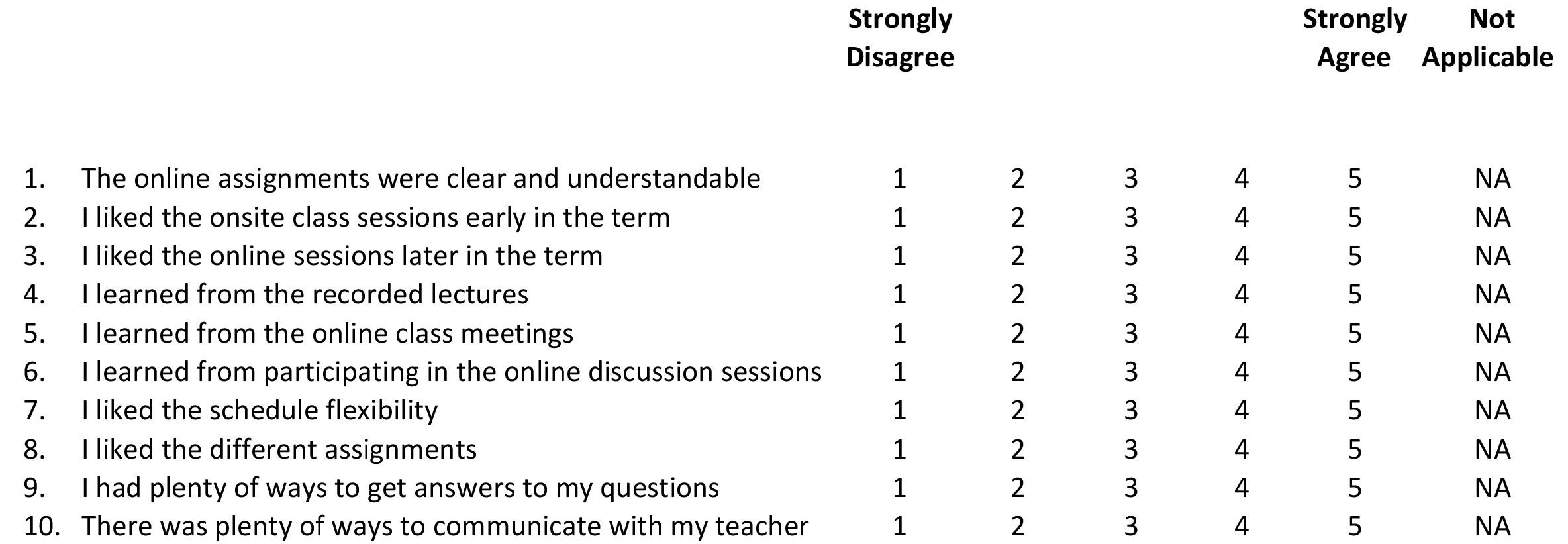
Gathering Online Teaching Feedback from Students and Yourself
06 May 2020Rating scale questions for students and opened-ended, thought-provoking questions about online teaching guide instructors in fall planning.
By Dr. Fred Mayo, CHE, CHT
As we utilize our online teaching skills to complete the semester or term, many of us are considering what the future will bring. Will we be teaching online in the fall? What worked well in online teaching? Did the success vary based on the course subject, level of the students, or technology used? What can we do differently next time?
Now might be a great time to collect your students’ feedback about their online learning experience and record your reflections on teaching. You can use the comments and information in planning for the future, whatever it may be.
Gathering feedback from your students
At the end of the term, most colleges and programs have some sort of standard system of collecting student comments about their classes. However, some of the normal questions are probably not relevant to this spring’s experiences. Consider developing your own instrument and sending it to students before the end of the term. Research indicates student evaluations should be completed before the term’s last few weeks when the workload can be heavy and there are no significant changes in teaching strategies or activities. The response rate for evaluations sent out before the end of the term tends to be higher than those disseminated during the final examination week and after.
Consider the answers to questions you really want to know. Ask your students to provide that information which will help you and your colleagues plan for the fall. I encourage you to use a Likert rating scale, so you have numbers to report. Remember a Likert scale uses statements not questions since it makes no sense to agree or disagree with a question. Also, the scale has an odd number of responses (normally five but possibly seven) that go from very negative on the left (strongly disagree) to very positive on the right (strongly agree).
Some of the questions you might want to ask include the following:

You may have your own questions to add, but this list may prompt you to consider what you want to ask.
You may also want to pose some open-ended questions about the hybrid nature of the course. Consider including the following questions:
- My reactions to the changes were …
- The way the changes were explained was …
- My comments about the hybrid nature of the course (half the class onsite and half online) are …
- Some things I will do differently as a result of this hybrid course include …
- The parts of this course I liked best are …
- The parts of this course I would like to see changed are …
- If you do more online teaching in the fall, please consider ….
Protecting privacy
Providing confidentially can be challenging if you distribute a form and ask students to complete it and email it back to you since you can trace their email addresses. Consider a few other options. How about sending them a form and asking it be printed, filled out and mailed to you? Or, ask them to complete an online form and return it to an alternative email address, such as a colleague? There may also be other options to protect privacy and guarantee confidentiality depending on your campus’s learning management system.
Recording feedback about your experience
On top of all your other work and the challenges of teaching in a new format, consider making some notes to yourself about the following topics:
- What worked best for me in this online teaching situation?
- What topics were easier to teach in this format?
- What topics were harder to teach in this format?
- What do I wish I had known before I started online teaching?
- What do I wish I had done differently?
- What changes do I want to make for the fall or next spring?
- What did I learn about my attitude toward teaching or about my teaching strategies?
Writing responses to these questions in bullet format or some easy way to record them now will help you when you combine the insights from student feedback and your own reflections. While you may remember the lessons you are learning now, most of us forget them when we start to plan for the next term. Consider taking a few minutes each week for the rest of the term to jot down your insights.
Summary
I hope these suggestions will assist you with gathering information about what has been happening this spring so you are better prepared for next fall. If you have comments on these ideas or suggestions for other topics or teaching practices you want discussed, send them to me at This email address is being protected from spambots. You need JavaScript enabled to view it. and I will include them in future Mayo Clinics.
Dr. Fred Mayo, CHE, CHT, is retired as a clinical professor of hotel and tourism management at New York University. As principal of Mayo Consulting Services, he continues to teach around the globe and is a regular presenter at CAFÉ events nationwide.
